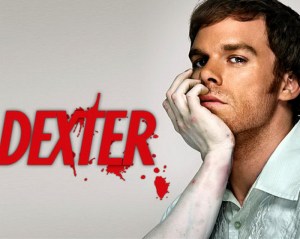Dexter
Dexter is a television drama series that debuted on Showtime in October 2006, with its most recent series premiering in October 2011. The series focuses on Dexter Morgan (played by Michael C. Hall), a “bloodstain pattern analyst for the Miami Metro Police Department who moonlights as a serial killer.” The main premise of the series is that there is typically a serial killer who the Miami Metro Police Department are trying to catch. What Dexter usually does is that he tries to catch the killer before the Police do (even though he works for the Police Department), so that he can kill the killer. The way he justifies killing is that he only kills those who have killed others. So in many ways he is like a vigilante. His mother was murdered when he was three and it was after that that Miami police officer Harry Morgan and his wife Doris had adopted Dexter. As a child Dexter used to kill a multitude of neighborhood pets for several years. It was at that time that his father began to teach him “The Code.” It was here that Dexter was told that his victims must be “killers themselves who have killed someone without justifiable cause and will likely do so again.” He must also be absolutely sure that they are guilty. More importantly, Dexter must never get caught. Despite all of this Dexter has successfully been able to present himself as “normal” and has been able to hide his dark secret from his adopted sister Debra Morgan.
The specific season that I will be analyzing is the most recent season, season 6. I will be using narrative analysis to break down this television series (more specifically Season 6) in hopes of opening the mind of the average viewer to a different way to look at the series characters and the roles that they play in the series. Before I go into detail I should define narrative analysis. According to the notes that I have taken in my media criticism class, narrative analysis is a “systematic study of texts and how they are structured into a cause-and-effect chain of events with a beginning, middle, and end.” By understanding the sequence of these events it helps reveal potential meaning embedded in texts.
I will be using Vladimir Propp’s “roles or spheres of action” to break down the sixth season of Dexter.
Season 6: Synopsis
As I break down Season 6 of Dexter I will be using Vladimir Propp’s “roles or spheres of action” and applying it to some of the central characters within the show. The question that I ask of the reader is, “why do we want to do a narrative analysis of Dexter?”. The answer to this question will come later on. But for now I will give a brief synopsis of the season before I break the show down; so if you follow the Dexter series and and have yet to see Season 6…
SPOILER ALERT!!!!
Stop reading now!!!
BUT for all intents and purposes I will assume that you have seen this season, you do follow Dexter, and that you don’t critically analyze television series for fun.
I digress….
So Season 6 starts out with a murder featuring strange religious symbolism that gets the attention of Miami Metro Homicide; the
killers, as yet unknown to Miami Metro, are two men who seem to be a master and a student. The two men will eventually be labeled as DDK (Dooms Day Killers) and would later be identified as Professor James Gellar and his student Travis Marshall. Their main objective is to bring about the end of the world through killings based on the Book of Revelation. It is here where Dexter is led through his investigation to Travis Marshall. Upon first contact with Travis, Dexter is told that Professor Gellar has been forcing Travis to aide him in the killings. Dexter then decides to let Travis live and asks him to help him kill Professor Gellar. However, Gellar has been dead for years and has only existed in Travis’ mind. Dexter learns this and now marks Travis as public enemy number one. Dexter eventually captures Travis and kills him. However in the final scene Dexter is caught killing Travis by his sister, and the last words he says is “Oh my God.”
Season 6: The Breakdown
It is here where “the villian(s)” (according to Propp) begin to surface. They are described by Propp, as individuals who seek to disrupt the equilibrium and who struggle against the hero. It is safe to say that even though he does kill people, that Dexter is undoubtedly the hero. The hero is someone “who’s quest is to restore the equilibrium, often motivated by lack of something (money, love, respect, etc).” For Dexter, his motivation is to simply rid the world of those who seek to destroy it.
One of Propp’s other roles, is “the donor.” He describes it as someone who gives the hero advice to help prepare the hero in his quest. In this season, the donor would be Brother Sam. Brother Sam was first introduced to Dexter because he was one of the potential suspects of the DDK case. Brother Sam was eventually dismissed as being a suspect but he would befriend Dexter. He presented Dexter with an alternative point of view on life and helps Dexter in becoming a better father to his son Harrison.
The “(magical) helper”, is someone who aids the hero in their quest for equilibrium. There are multiple “helpers” in the season due to the fact that most of the Miami Police Department is trying to catch DDK, but the one who directly tries to help Dexter, is his father Harry. Harry appear’s to Dexter as a “ghost” who comments on and gives advice on all the problems his son faces throughout the series.
The “princess” is someone who needs help, protecting and saving. The one who is in most need of protecting is Dexter’s adopted sister Debra. Although she is one of the most strong-willed characters in the show, she has a lot on her plate (especially this season). She was promoted to the role of Lieutenant at start of the season and was extremely stressed throughout the season. She began talking to a therapist at the police station and she revealed that she wanted Dexter to talk to her from time to time because he makes her feel safe and she looks up to him. It would later be revealed that she had hidden sexual feelings towards him.
The last one of Propp’s characters is “the false hero/anti-hero.” These are individuals who set out to undermine the hero’s quest by pretending to aid them. In this season, the false hero would be also be the villain. Travis Marshall who falsely tricked Dexter into thinking that he was a pawn in Gellar’s master plan to destroy the world had pretended to aid Dexter and would eventually try to kill him.
Why? What does it all Mean?
I asked the question at the start of this, “why do we want to do a narrative analysis of Dexter?”
The answer is because it allows the audience to gain a better understanding of the show and the characters in the show. It is a way to really analyze the plot and all that it has to do with. When you do a narrative analysis you are able to identify who the key characters are in the series. You are able to see how the roles change as the series go on. It also allows the audience to better connect with the characters and understand who they are. Hopefully by pointing out the roles that each character plays in the series, you have gained a better understanding of who they are and will be able to watch the show with a new perspective.


